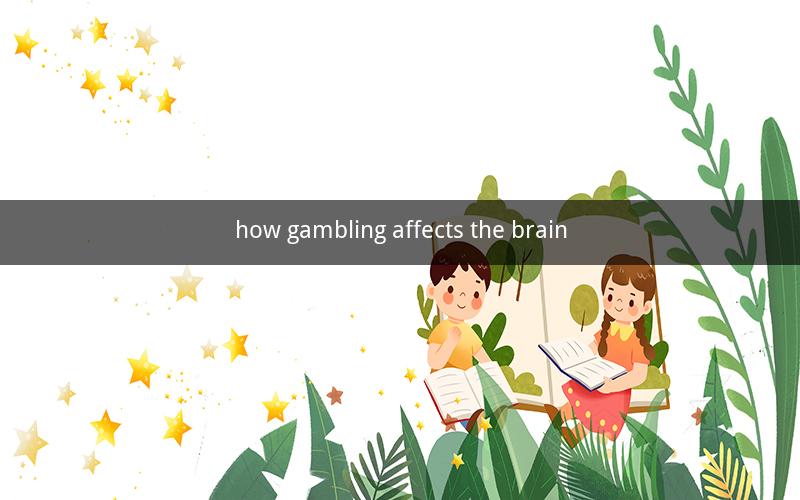
Table of Contents
1. Introduction to Gambling and the Brain
2. The Science Behind How Gambling Affects the Brain
3. Dopamine and the Reward System
4. The Role of the Prefrontal Cortex
5. The Impact of Chronic Gambling on the Brain
6. Cognitive and Emotional Consequences
7. Coping with the Effects of Gambling on the Brain
8. Conclusion
1. Introduction to Gambling and the Brain
Gambling, an activity that has been around for centuries, has always held a certain allure. However, the allure of gambling extends beyond the thrill of winning; it has a profound impact on the human brain. Understanding how gambling affects the brain is crucial in addressing the potential risks and consequences associated with this activity.
2. The Science Behind How Gambling Affects the Brain
The brain is a complex organ that is highly sensitive to various stimuli, including those related to gambling. When individuals engage in gambling activities, the brain undergoes several changes, both in the short and long term.
3. Dopamine and the Reward System
One of the primary factors that drive individuals to gamble is the release of dopamine, a neurotransmitter associated with pleasure and reward. When individuals win, their brains release dopamine, creating a sense of euphoria and reinforcing the desire to continue gambling.
4. The Role of the Prefrontal Cortex
The prefrontal cortex, a region of the brain responsible for decision-making, impulse control, and judgment, plays a crucial role in gambling. When individuals engage in gambling, the prefrontal cortex becomes less active, making it more difficult for them to make rational decisions and control their impulses.
5. The Impact of Chronic Gambling on the Brain
Chronic gambling can have severe long-term effects on the brain. It can lead to changes in brain structure and function, affecting various cognitive and emotional processes. These changes can include reduced gray matter volume, altered connectivity between brain regions, and impaired decision-making abilities.
6. Cognitive and Emotional Consequences
The effects of gambling on the brain extend beyond cognitive impairments. Emotional consequences, such as anxiety, depression, and mood swings, are also common. These emotional changes can further exacerbate cognitive difficulties and lead to a cycle of gambling and distress.
7. Coping with the Effects of Gambling on the Brain
Coping with the effects of gambling on the brain requires a multifaceted approach. This includes seeking professional help, such as therapy or counseling, developing healthy coping mechanisms, and building a supportive social network.
8. Conclusion
Understanding how gambling affects the brain is essential in addressing the potential risks and consequences associated with this activity. By recognizing the impact of gambling on the brain, individuals can make informed decisions about their gambling habits and seek help when necessary.
---
Questions and Answers
1. What is the role of dopamine in gambling?
- Dopamine is a neurotransmitter associated with pleasure and reward. When individuals win, their brains release dopamine, creating a sense of euphoria and reinforcing the desire to continue gambling.
2. How does chronic gambling affect the prefrontal cortex?
- Chronic gambling can lead to reduced activity in the prefrontal cortex, making it more difficult for individuals to make rational decisions and control their impulses.
3. What are the cognitive consequences of gambling on the brain?
- Cognitive consequences of gambling on the brain include reduced gray matter volume, altered connectivity between brain regions, and impaired decision-making abilities.
4. How can individuals cope with the emotional consequences of gambling?
- Individuals can cope with the emotional consequences of gambling by seeking professional help, developing healthy coping mechanisms, and building a supportive social network.
5. What are some signs of gambling addiction?
- Signs of gambling addiction include increased preoccupation with gambling, a need to gamble more to achieve the same thrill, lying about gambling activities, and experiencing negative consequences due to gambling.
6. How can family and friends support someone struggling with gambling addiction?
- Family and friends can support someone struggling with gambling addiction by offering empathy, encouraging them to seek help, and providing a supportive environment.
7. What are some treatment options for gambling addiction?
- Treatment options for gambling addiction include therapy, counseling, support groups, and medication, depending on the individual's specific needs.
8. How can individuals prevent the negative effects of gambling on the brain?
- Individuals can prevent the negative effects of gambling on the brain by setting limits on their gambling activities, being aware of the risks, and seeking help when necessary.
9. What is the link between gambling and mental health issues?
- There is a strong link between gambling and mental health issues, such as anxiety, depression, and mood swings. Chronic gambling can exacerbate these issues and lead to a cycle of distress.
10. How can society address the issue of gambling addiction?
- Society can address the issue of gambling addiction by raising awareness about the risks associated with gambling, implementing stricter regulations on gambling activities, and providing resources for individuals struggling with gambling addiction.